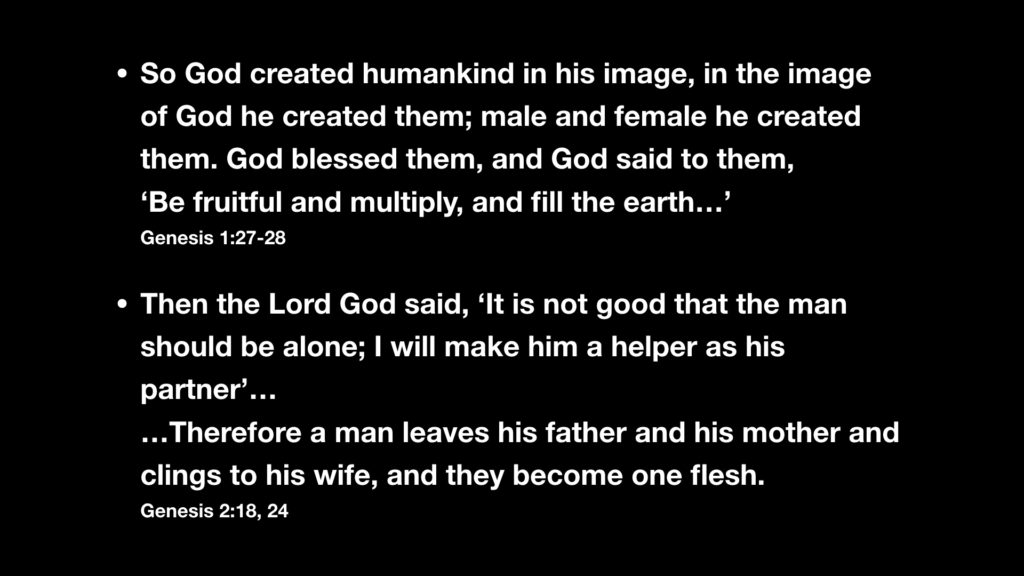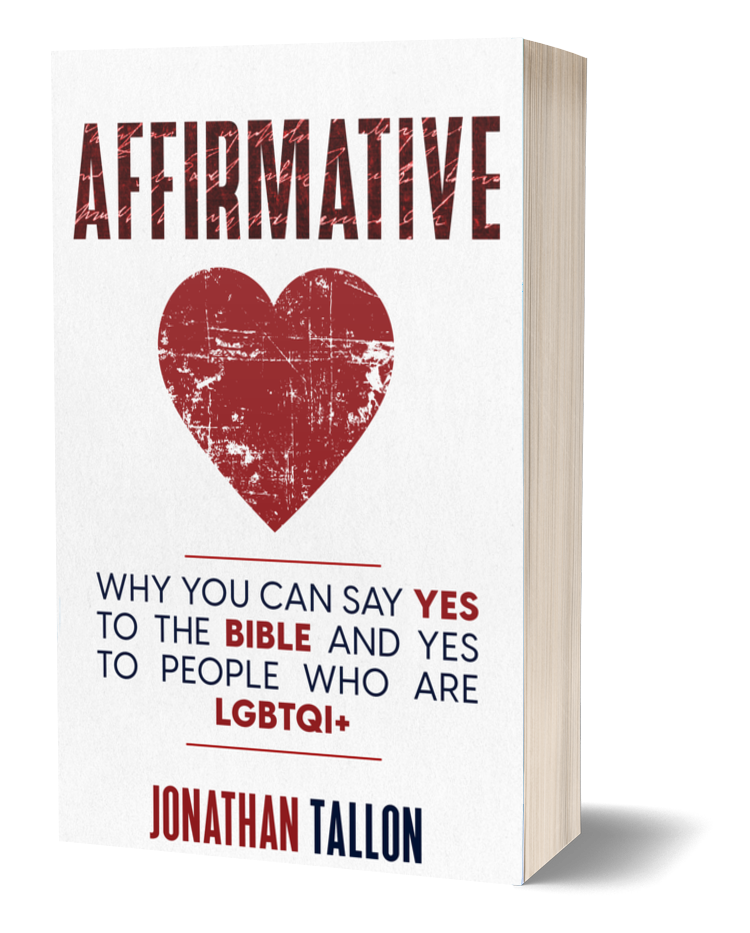This video explains why the creation accounts in Genesis do not rule out same-sex marriages. God blesses the union of men and women, but that doesn’t mean that God can’t or won’t bless other patterns of life, whether that’s gay or lesbian couples, being married without children, or singleness.
Transcript
It’s Adam and Eve, not Adam and Steve! Have you heard Genesis used this way to rule out homosexuality? Keep watching to find out why I think that’s misguided.
People argue that the creation accounts in Genesis only allow a man and a woman to be married. Let’s have a look at them.

The broad picture is clear. God creates humankind, and blesses them. In particular, he blesses the union of a man and a woman. Notice that we haven’t got clear commands or prohibitions here. We have an account, a narrative. It’s the story of creation, not commands to create.
Is Genesis prescribing or describing?
So here’s the question.
Is it prescriptive – it has to be this way, and only this way – or is it descriptive – it describes what God blesses?
I think it’s descriptive – it describes what’s broadly true for most people, most of the time. Men and women fall in love, and marry and have children, and God blesses that.
But it’s not prescriptive, because if you try and understand Genesis in this way you run into all sorts of problems.
Be fruitful…
Let’s look at ‘be fruitful’ – is it necessary? Is it prescribed? Is having children an essential part of marriage? What about couples who can’t have children – can they still marry? Or if you do marry and then discover you can’t have children, do you have to get divorced?
You never hear this argued in Church. But it’s not a theoretical question – parts of ancient Judaism interpreted Genesis and other parts of the Bible precisely this way.
In the Mishnah, a collection of ancient Jewish oral tradition, one saying suggested that if a couple had no children after ten years, the husband was obliged to divorce his wife.
Philo, a Jewish writer living in Egypt about the time of Jesus, argued that marrying someone you knew to be infertile made you an enemy of God.
And also, what about those people who would like to marry but haven’t found the right person?
Churches are full of single people – most of them don’t feel called to lifelong celibacy. Are they somehow inferior to those who are married with children? Are they not properly in the image of God?
And what about those do choose lifelong celibacy? Where do they figure in this interpretation of Genesis?
Again, this is not just a theoretical question. Parts of ancient Judaism condemned those who voluntarily chose celibacy as being contrary to God’s commandments. It was the duty of every Jewish male to marry and to have children.

But Christianity has never interpreted the Bible this way. The command ‘be fruitful’ applies not to every individual, but to the human race as a whole, as Aquinas argued a thousand years ago.
And If you emphasise procreation, having children, as being essential, frankly you’re in danger of turning Christianity into a fertility cult.
…leaves his father and mother…
And anyway, how prescriptive are we going to take the account in Genesis? It says in scripture, ‘therefore a man leaves his father and mother and clings to his wife…’ or in the more traditional language, ‘cleaves unto his wife’.
Does that mean that once you’re married you can’t stay with the husband’s parents?
‘I’m sorry son, I know you’re newly married and you’ve nowhere to go, but you’ll have to leave. That’s what it says in Genesis’.
Genesis describes, not prescribes
This is why it makes more sense to see Genesis as being descriptive rather than prescriptive.
Sure, God blesses those who marry and move out from their parents and have children, but God can also bless those who don’t fit that particular pattern.
Companionship
And once we see this, we can begin to see other features in the account as well. Notice how it says it wasn’t good for the human to be alone.
In Genesis 2, the reason for Eve’s creation isn’t to have children, it’s to be a partner – and God sees that as a good thing. Companionship is important. But what about those who find a companion of the same sex?
But some may say, in Genesis the partners are male and female, not male and male or female and female. Well, yes.
Because for most people, throughout human history, that’s what happens. Most men are attracted to women. Most women are attracted to men. Most couples have children.
We’re dealing here with an exception to the majority, and the creation accounts don’t deal with exceptions, whether that’s same-sex couples, or those who are choose celibacy, or those who marry but can’t have children.
Conclusion
So, is simply saying that Genesis is about Adam and Eve a knock-down argument against homosexuality? No – no more than it’s an argument against singleness.
God blessing Adam and Eve doesn’t mean condemnation for Adam and Steve.

This is part of a series of videos looking at the Bible and homosexuality. If that interests you, subscribe to the channel. And if you want to find out more about ancient Jewish and Christian interpretations of Genesis, you can go to the companion website, bibleandhomosexuality.org.
The next passage that usually comes up is the story of Sodom and Gomorrah in Genesis 18 & 19 – here’s my explanation of the passage.
Found this helpful? You can now get the material from this website and more in a book. Affirmative: Why You Can Say Yes to the Bible and Yes to LGBTQI+ People is available at Amazon and other major retailers. You can find out some more about the book here.
Resources
In the transcript I refer to the Mishnah. This is a collection of oral laws that dates from around AD200 (though it includes traditions far older). There are debates both about how much these were observed by ordinary Jews, and also how far these applied in the time of Jesus and Paul (the Jewish rebellion of AD66 and the Roman reaction are significant in shaping Judaism). I use the extracts from the Mishnah (m.Yevamot 6.6) to show how it is possible to take Genesis as prescriptive, and where the logic of that leads. The critical edition is:
Penka, Gabriele, Die Mischna: textkritische Ausgabe mit deutscher Übersetzung und Kommentar, Jevamot (Schwägerinnen), Jerusalem, 2009.
However, you can also find editions online with English translations. Here are a couple of examples of m.Yevamot 6.6:
http://www.emishnah.com/Nashim_Vol_1/Yev6.pdf
Or:
https://www.sefaria.org/Mishnah_Yevamot.6.6?lang=bi
I also refer to Thomas Aquinas’ argument that the command to be fruitful applied to the whole of humankind rather than every individual. The reference is:
Aquinas, Summa Theologicae 2.152.2.
In the video I rounded up when I said that he argued this ‘a thousand years ago’ – a more precise figure would be about 750 years.
Aquinas is part of the long Christian tradition that has never seen marriage and procreation as obligatory (a tradition that, of course, goes back to Paul and Christ).
The Genesis creation accounts appear to have become more prominent in arguments recently. Generally, I have found that some commentators make extremely strong statements about the interpretation of these narratives on extremely shaky ground. This applies not only to the use of Genesis 1-3 in statements and arguments about homosexuality, but to a wide variety of issues on gender and sexuality, including transgender.


